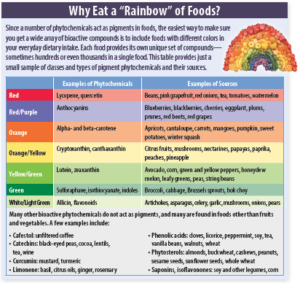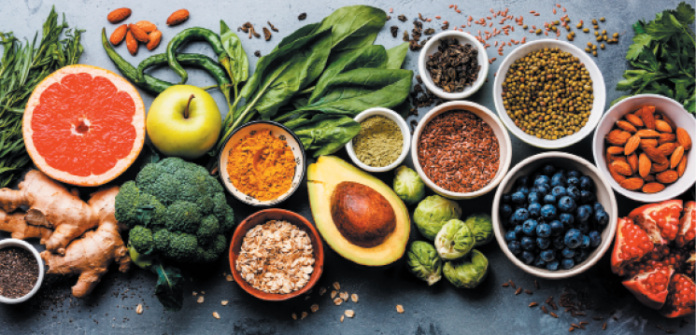Each plant we consume contains hundreds of phytochemicals. Scientists are just beginning to understand how these fascinating plant compounds behave in our bodies. We talked to Jeffrey B. Blumberg, PhD, professor emeritus at Tufts’ Friedman School and former director of the Antioxidants Research Laboratory at the Human Nutrition Research Center on Aging, to find out what we know about how phytochemicals impact our health.
Q: What are phytochemicals?
Dr. Blumberg: Phytochemicals are compounds found in plant foods. A more consumer friendly term is phytonutrients. While some plant compounds may have little impact in our bodies, many are bioactive and beneficial when we consume them.
All minimally processed plant foods, including fruits, vegetables, whole grains, beans, nuts and seeds, coffee, teas, and spices contain these bioactive compounds. Fungi (like mushrooms), molds, yeasts, and algae like seaweed do, too.
Q: How many phytochemicals are there?
Dr. Blumberg: We don’t know yet! There are millions of phytochemicals in the natural world. The scientific community has studied only about 150 in depth. We know a fair amount about how these are absorbed, distributed, and metabolized, and what they do in the body. There are about 4,000 more that have been characterized–meaning we know their chemical structure and in which foods they’re found, but don’t know much about their bioactivity or impact on health outcomes. In all, scientists have chemically identified about 100,000 phytochemicals in plant foods. But new analysis techniques have allowed us to map at least 1.2 million other compounds we don’t know anything about yet! These may not all be bioactive, but many of them certainly will be.
Q. Why don’t we know more? 
Dr. Blumberg: Work on phytonutrient intake and health outcomes started in the late 1990s, so we’re relatively early in the game. But science moves at an incredibly rapid pace these days. There are now advanced technologies and instruments like mass spectrometers to find compounds and help determine their chemical structure. And we have artificial intelligence and machine learning to help scientists make sense of enormously complex data that would once have been impossible to manage or take years to process.
Q. What do phytochemicals do in our bodies?
Dr. Blumberg: Scientists believe most of the 150 phytochemicals that have been studied in-depth have actions in the body that can help us live healthier lives and reduce the risk for chronic disease. Just like vitamins and minerals, different phytochemicals have different effects. Some have an effect on the immune system, others are involved in glucose regulation and insulin secretion, and others have antioxidant activity. We know some can cross the blood-brain barrier, so they may have an effect on cognitive performance or an impact on neurodegenerative disease.
Q. How do we ensure we get enough?
Dr. Blumberg: That’s an important question, since most people likely do not get enough. One simple approach to increase phytonutrient intake is to eat a wide range of minimally processed plant foods—and seek out a rainbow of choices. Many phytochemicals are also plant pigments (colors), so eating a rainbow of foods provides a spectrum of phytochemicals (see chart).
If you are eating less than two servings of fruit and two servings of vegetables daily, you are falling short of your need for phytonutrients. I recommend taking small steps: eat one more fruit and one more serving of vegetables a day. When that becomes natural, add another, and subtract out a less desirable choice (like refined grains and sweets). Beyond fruits and vegetables, you can also add nuts, seeds, beans, phytonutrient-rich whole grains like barley or oats, teas and coffees, and natural spices.
Eat Plants! Choose a wide variety of colorful fruits and vegetables, along with legumes, nuts, seeds, whole grains, and mushrooms in place of refined grains, processed meats, and foods high in added sugars and salt.
Avoid Supplements. There is no data yet that phytonutrient supplements are helpful, and too much of any one compound has potential to be harmful. Aim for a healthy dietary pattern instead.
Q. Should we be taking phytonutrient supplements?
Dr. Blumberg: There are over a million phytochemicals in the foods we eat, and you aren’t going to find the vast majority of them in any supplement. The science suggests that it’s not any one specific, single phytonutrient that is critical for health, but rather whole classes of different ones. Focusing on a high-quality diet–mostly of minimally processed plants–is the way to go. Not only does eating a wide variety of colorful plant foods provide a variety of phytonutrients, it also pushes less healthy choices off your plate.
























